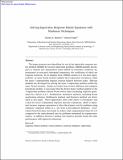Solving eigenvalue response matrix equations with nonlinear techniques
Author(s)
Roberts, Jeremy Alyn; Forget, Benoit Robert Yves
DownloadANUCENE-D-13-00770R1-1.pdf (431.9Kb)
PUBLISHER_CC
Publisher with Creative Commons License
Creative Commons Attribution
Terms of use
Metadata
Show full item recordAbstract
This paper presents new algorithms for use in the eigenvalue response matrix method (ERMM) for reactor eigenvalue problems. ERMM spatially decomposes a domain into independent nodes linked via boundary conditions approximated as truncated orthogonal expansions, the coefficients of which are response functions. In its simplest form, ERMM consists of a two-level eigenproblem: an outer Picard iteration updates the k -eigenvalue via balance, while the inner λλ-eigenproblem imposes neutron balance between nodes. Efficient methods are developed for solving the inner λλ-eigenvalue problem within the outer Picard iteration. Based on results from several diffusion and transport benchmark models, it was found that the Krylov–Schur method applied to the λλ-eigenvalue problem reduces Picard solver times (excluding response generation) by a factor of 2–5. Furthermore, alternative methods, including Picard acceleration schemes, Steffensen’s method, and Newton’s method, are developed in this paper. These approaches often yield faster k-convergence and a need for fewer k-dependent response function evaluations, which is important because response generation is often the primary cost for problems using responses computed online (i.e., not from a precomputed database). Accelerated Picard iteration was found to reduce total computational times by 2–3 compared to the unaccelerated case for problems dominated by response generation. In addition, Newton’s method was found to provide nearly the same performance with improved robustness.
Date issued
2014-02Department
Massachusetts Institute of Technology. Department of Nuclear Science and EngineeringJournal
Annals of Nuclear Energy
Publisher
Elsevier
Citation
Roberts, Jeremy A., and Benoit Forget. “Solving Eigenvalue Response Matrix Equations with Nonlinear Techniques.” Annals of Nuclear Energy 69 (July 2014): 97–107.
Version: Author's final manuscript
ISSN
03064549